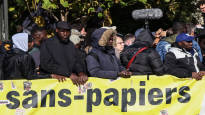The decision-makers of the big EU countries discussed a tougher migration policy on Monday. The reflection of the Gaza war on Europe increases the pressure on politicians.
BERLIN The leaders of both Germany and France met on Monday to discuss immigration, which has quickly become a political hot potato in both countries. In both countries, the decision-makers are very confused about what should be done.
In Germany, the municipalities are demanding more money from the federal government and the states to cope with the rapidly growing number of arrivals. There are not enough places to stay, not to mention school or kindergarten places. The number of visitors has surprised everyone this year.
In France, on the other hand, the Senate will discuss the Prime Minister within this week Elisabeth Bornen a very contradictory law change, which both right-wing parties and left-wing parties in the opposition are on the back foot.
Germany is making an almost complete turnaround
Before Monday evening’s meeting, the Chancellor By Olaf Scholz especially the states led by the largest opposition party, the CDU, demand that in the future asylum applications be processed outside Europe’s borders.
The far-right party Vaihto Sakalle, which came in second in the polls, has demanded the same. Also some green support the idea that applications would be processed closer to the asylum seekers’ home countries in the future.
Gone are the days when Germany practically followed an open-door policy regarding asylum seekers from the crisis areas of the Middle East. In the peak years of the European migrant crisis in 2015 and 2016, the then Chancellor Angela Merkel Germany took in more than a million migrants who fled from, for example, Syria and Iraq.
Just eight years later, the atmosphere has completely changed. Political parties are competing over who can come up with more effective ways to curb illegal border crossings.
There is talk of both cutting benefits for asylum seekers and reducing their number. Control at the borders of Poland, the Czech Republic and Switzerland has already been increased.
In France, you shouldn’t violate the “values of the republic”
In France, the Senate began the discussion of a highly controversial immigration law on Monday.
The left blames the president Emmanuel Macron about inciting the extreme right and jeopardizing the human rights of asylum seekers.
According to the bill, asylum seekers’ right to appeal against decisions and administrative actions concerning them would be weakened. A residence permit could be revoked or not renewed for someone who “does not follow the principles of the republic”.
An asylum seeker could be removed from France, even if he or she is in need of protection under current law. For example, those who arrived in France under the age of 13 or who have lived there for a long time could be deported if the foreigner’s behavior is considered a “serious threat to public order”.
According to human rights organizations, first of all, we should define what a serious threat and public order exactly mean.
On the other hand, France is giving legal status to undocumented workers who work in sectors suffering from labor shortages. The far right has opposed this.
The French Parliament, or National Assembly, will finally vote on the new law in December. The government says the legal package will strengthen the safety of those in the country who have their papers in order.
The situation in Gaza exacerbates the atmosphere
In both countries, unrest in the streets has been increased by the war in Gaza. The social atmosphere has clearly tightened when the conflict has also moved to Europe.
Above all, immigrants with a Muslim background have been seen and heard in the demonstrations supporting Palestine. Anti-Semitism, i.e. anti-Jewishness, has increased.
It causes the division of society into camps, and has caused some of Germany’s silent majority to worry about the situation.
